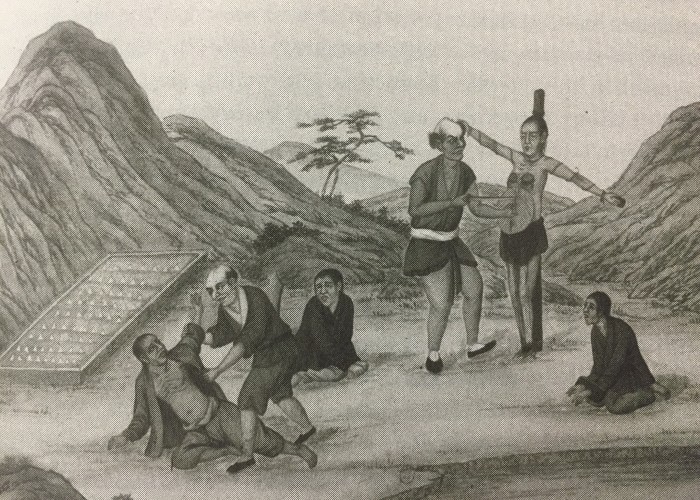Contributions by Andrea Rosenberg
Andrea Rosenberg is a translator from Spanish and Portuguese. Among her published and forthcoming full-length translations are Tomás González’s The Storm (Archipelago Books 2018), Inês Pedrosa’s In Your Hands (AmazonCrossing 2018), Aura Xilonen’s The Gringo Champion (Europa Editions 2017), Juan Gómez Bárcena’s The Sky over Lima (Houghton Mifflin 2016), and David Jiménez’s Children of the Monsoon (Autumn Hill Books 2014). She holds an MFA in literary translation and an MA in Spanish from the University of Iowa, and she has been the recipient of awards and grants from the Fulbright Program, the American Literary Translators Association, and the Banff International Literary Translation Centre.Nikkō’s a Real Trip
Matías Ariel Chiappe Ippolito
translated by Andrea Rosenberg
日々旅にして旅を栖とす。
(松尾芭蕉)
“Every day is a journey, and the journey itself is home.”
–Matsuo Bashō, tr. Sam Hamill
I’d been told I should get in touch with Hideki, whom everybody calls “the sensei.” I thought I was prepared for my visit to the city of Nikkō—I’d asked a number of people and looked at a bunch of websites; I’d even acquired a tourism pamphlet about Tochigi Prefecture that I hadn’t gotten a chance to read yet. I knew about the surrounding area: Kegon Falls, the Shinkyo Bridge, Mount Nantai. I knew that the main attraction was the Rinnoji Temple and the shrines of Futarasan and Toshogu, the latter of which houses the tomb of Ieyasu Tokugawa, the first shogun of the Edo period. I knew I was about to … Read More »
Kanada (excerpt)
Juan Gómez Bárcena
Translated by Andrea Rosenberg
You go to the window to watch the Neighbor leave. He’s accompanied by two men. They’re wearing hats pulled down tight over their ears and a sort of kerchief or scarf that leaves only their eyes exposed. But you recognize them anyway: you’ve seen them many times under this very window, carrying their portfolios and their leather briefcases. They look like they’re in a hurry, and the Neighbor is practically dragging his leg as he limps along. You watch them head down the street toward the river.
They disappear.
From the other side of the wall, the voice of the Girl again. She switches from world capitals to multiplication tables, where she seems more self-assured and more mechanical, and from there to the right and left tributaries of the Danube, and finally to a long … Read More »
The Forgotten Sense (fragment)
Pablo Maurette
translated by Andrea Rosenberg
In the winter of 1904–1905, in Beijing, a bodyguard named Fuzhuli was accused of killing his master, a Mongol prince, with a butcher knife. The punishment set forth by the Qing code[1] for crimes of such a serious nature (regicide, patricide, matricide, and other “enormicides”) was the infamous execution by lingchi, which had been practiced in China since the time of the Liao dynasty (tenth century). Lingchi, commonly translated as “death by a thousand cuts,” consisted of tying the condemned man to a post and cutting him into pieces. On that winter morning in the Beijing vegetable market, before a silent crowd, the executioner began carving large slices of flesh off Fuzhuli’s chest, biceps, and thighs; then cut off his limbs; and finally decapitated him. Once the process was over, the executioner … Read More »
Black Ball
Mario Bellatin
translated by Andrea Rosenberg
1- BLACK BALL RELOADED
Author’s first look at the bande dessinée Black Ball
Yesterday I received some information about the Czech writer Bohumil Hrabal. I replied that toward the end of his life he’d seemed unable to bear the too loud a solitude in which he lived. So he’d climbed out onto a window ledge on an upper floor of the nursing home they’d put him in and leaped into the void. The response I received said that during his last years he’d been obsessed with the bustling pigeons he could see through the windows of the ward as he lay in bed. Maybe he wanted to turn into a bird, said the message. Maybe that’s why he’d attempted to fly, as if he were one of them. The person writing to me was my psychoanalyst. … Read More »
Passages: My Art as an Everything
Natalia Brizuela on Nuno Ramos
translated by Andrea Rosenberg
“No sé.” “I don’t know.” That’s the response Tintin and Captain Haddock get from the inhabitants of the Andean country—vaguely reminiscent of Peru—where they’ve traveled in search of their friend, Professor Calculus, who has been kidnapped and taken there by the last descendants of the Incas. Whenever Tintin and Haddock encounter someone—all of them with indigenous features—and ask if they’ve seen their friend, the natives respond, “I don’t know.” That “I don’t know” is the resistance of the colonial subject. That negation is the power of the powerless: “You can arrest me, you can interrogate me, you can torture me, you can exterminate my people, but you can’t make me talk.” Today the phrase arrives on the shores of the Río de la Plata in the form of an embodied echo: … Read More »
Lions
Iosi Havilio
translated by Andrea Rosenberg
And in the middle of the day came the night . . . Down the hill, all made of shadows, the Protagonist strides along the paving stones, midway between the cordon and the buildings, left, right, left. The past approaches and he gives in to it: all those moments of afternoon and freedom festering in the open air, consuming down the block, amid zombies and doormen. Nearer by, businesses, those tender galaxies of cheap hankerings, of good rates, of infinite love for the craft, record shops, discount stores, lottery ticket sellers, lingerie boutiques, all crammed together, embracing him to recall those aimless hours . . . unhurried, unhurried, ly: the syndicalist girlfriend with a satellite phone, the boy with the acid feet, the ardent interlocking of tall glasses wet with Criadores whisky, the … Read More »
Black Ball
Mario Bellatin
translated by Andrea Rosenberg
1- BLACK BALL RELOADED
Author’s first look at the bande dessinée Black Ball
Yesterday I received some information about the Czech writer Bohumil Hrabal. I replied that toward the end of his life he’d seemed unable to bear the too loud a solitude in which he lived. So he’d climbed out onto a window ledge on an upper floor of the nursing home they’d put him in and leaped into the void. The response I received said that during his last years he’d been obsessed with the bustling pigeons he could see through the windows of the ward as he lay in bed. Maybe he wanted to turn into a bird, said the message. Maybe that’s why he’d attempted to fly, as if he were one of them. The person writing to me was my … Read More »









 sending...
sending...